16.3.09 Accentual structure of the English language The

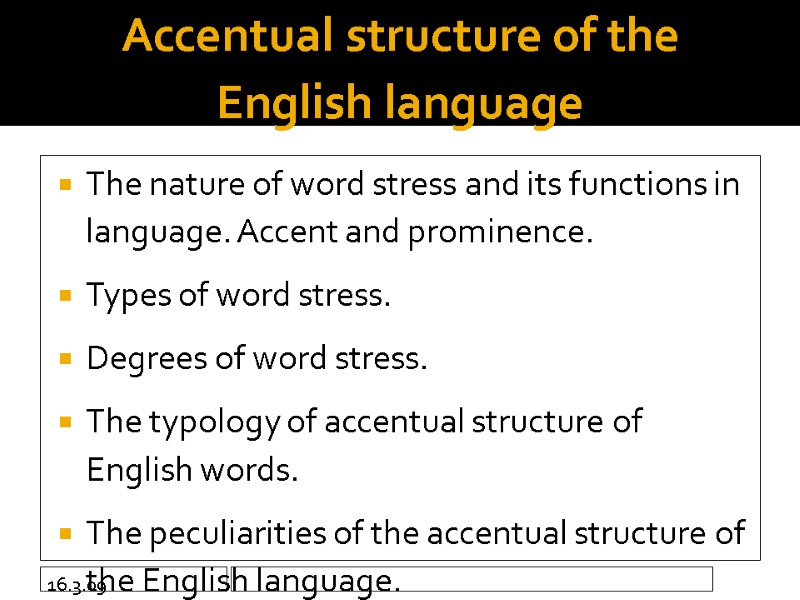
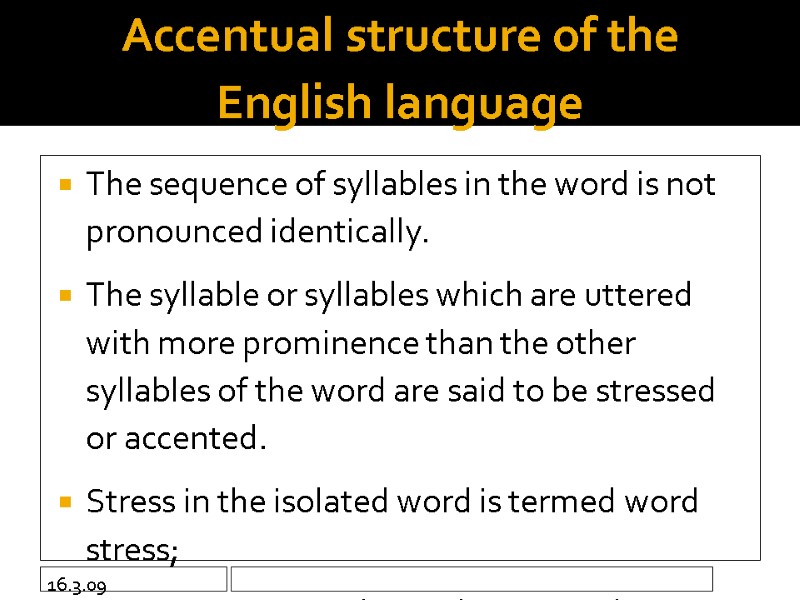
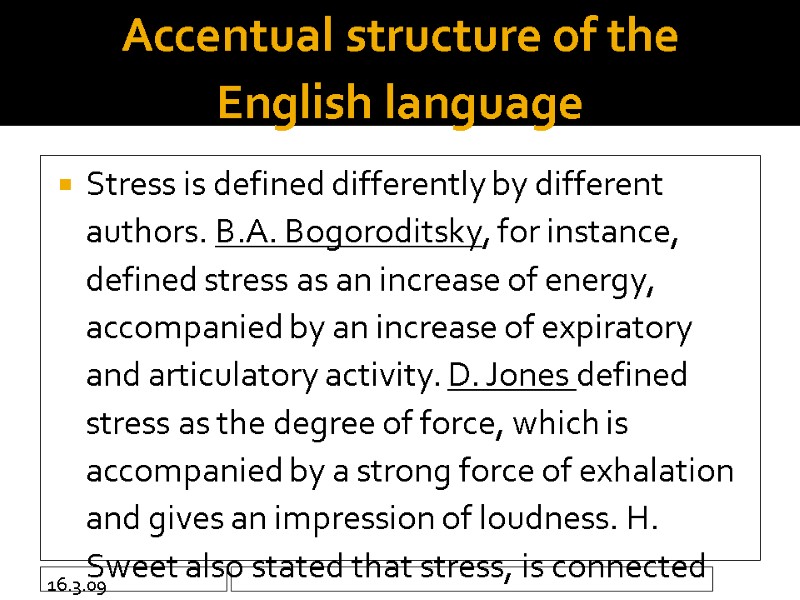
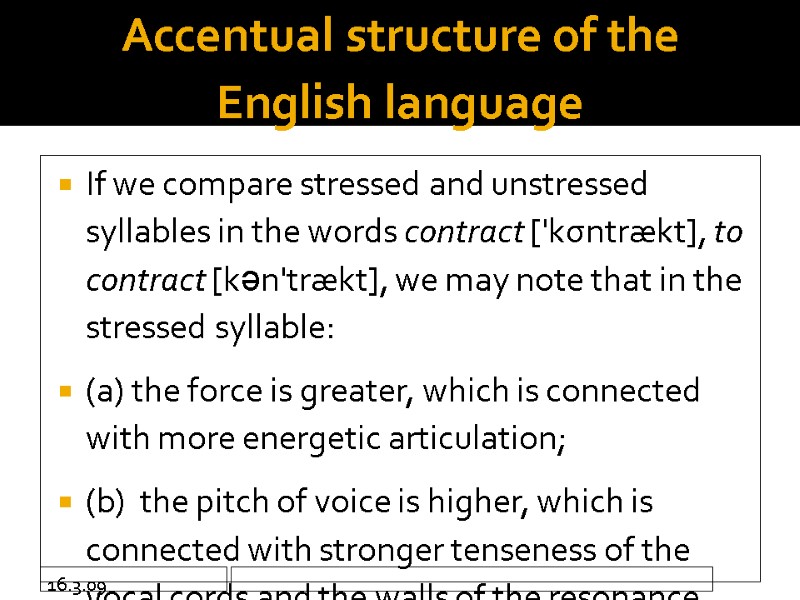
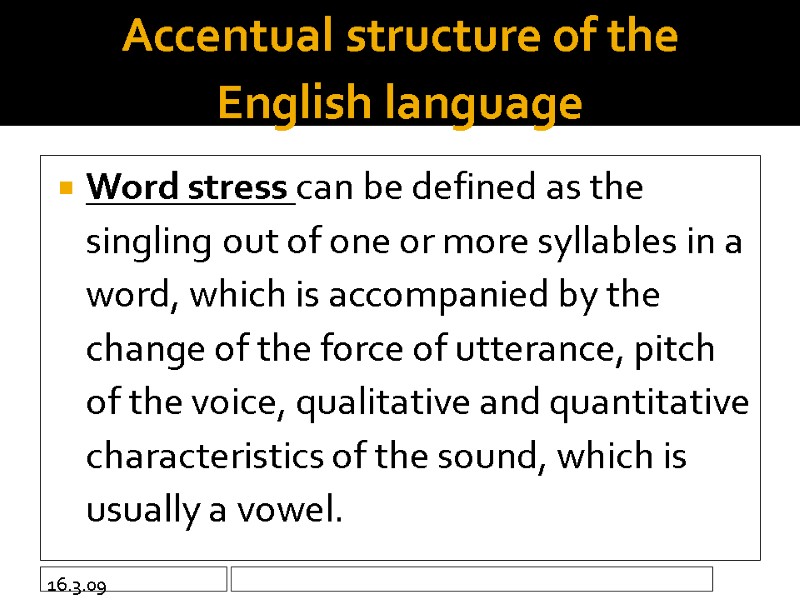
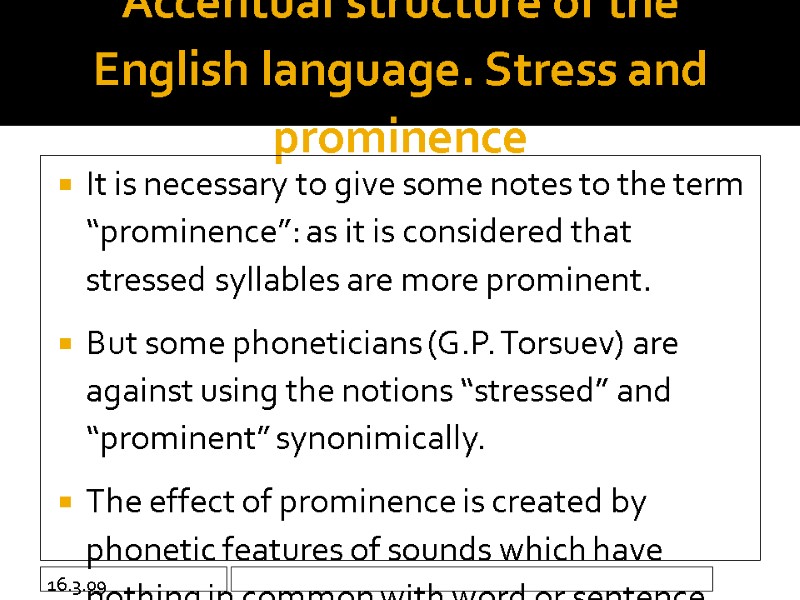
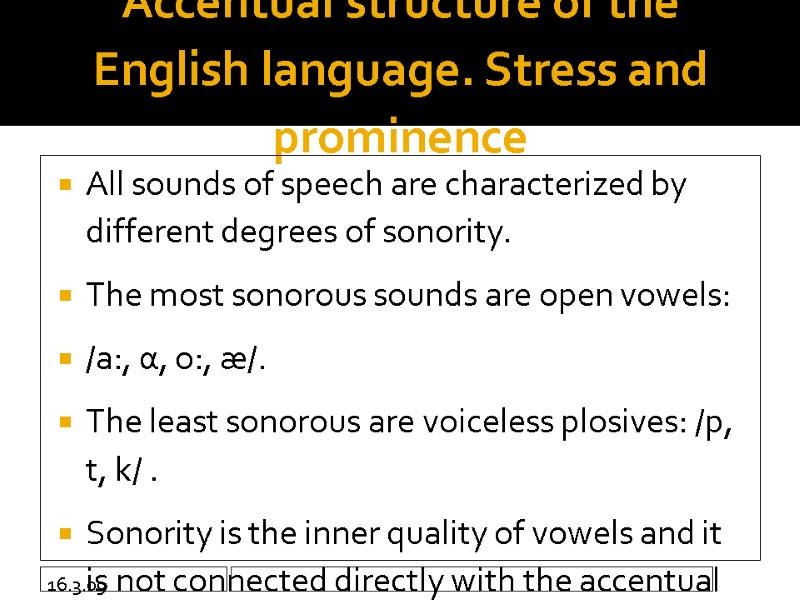
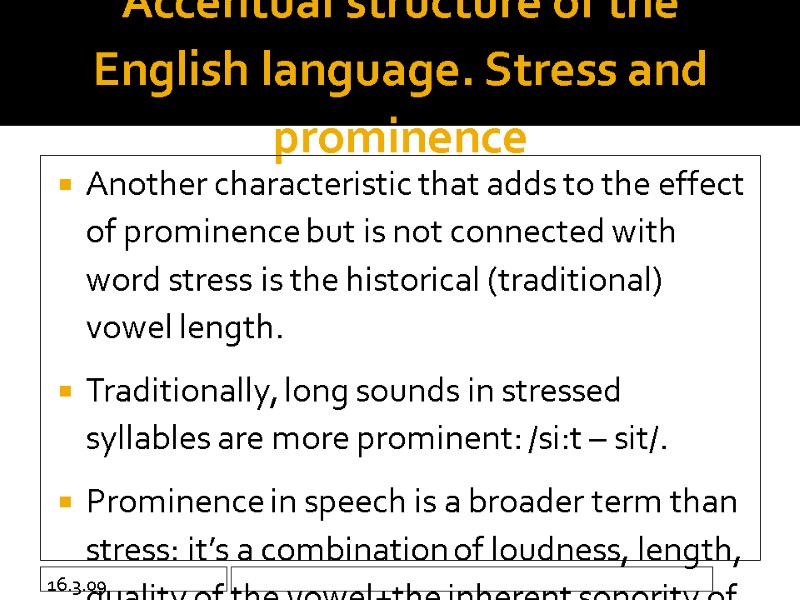
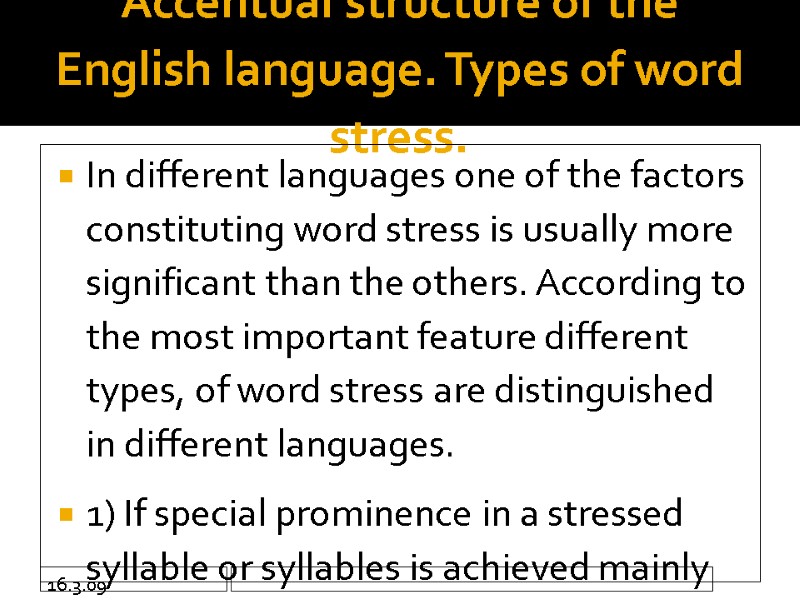
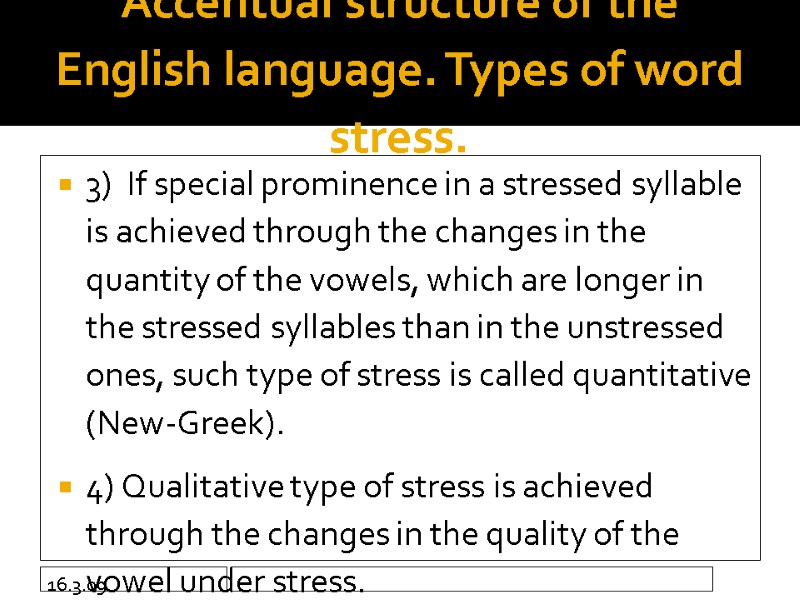
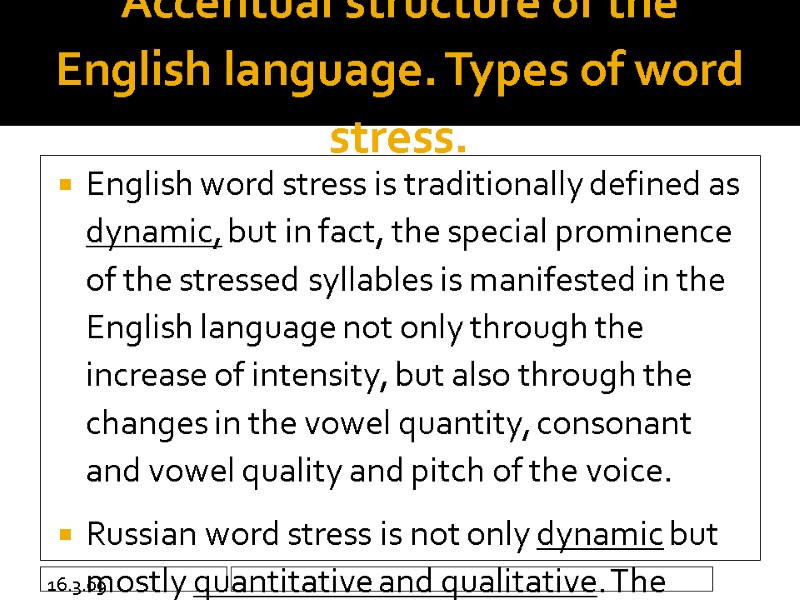
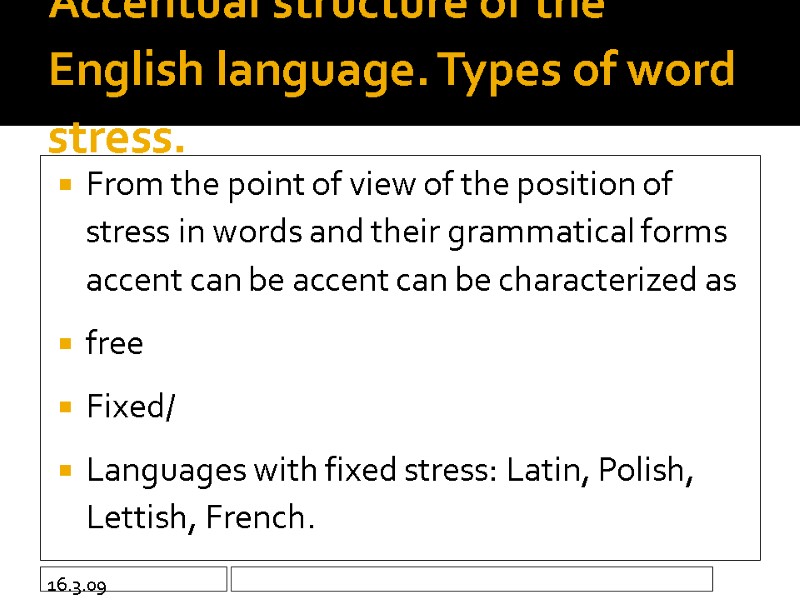
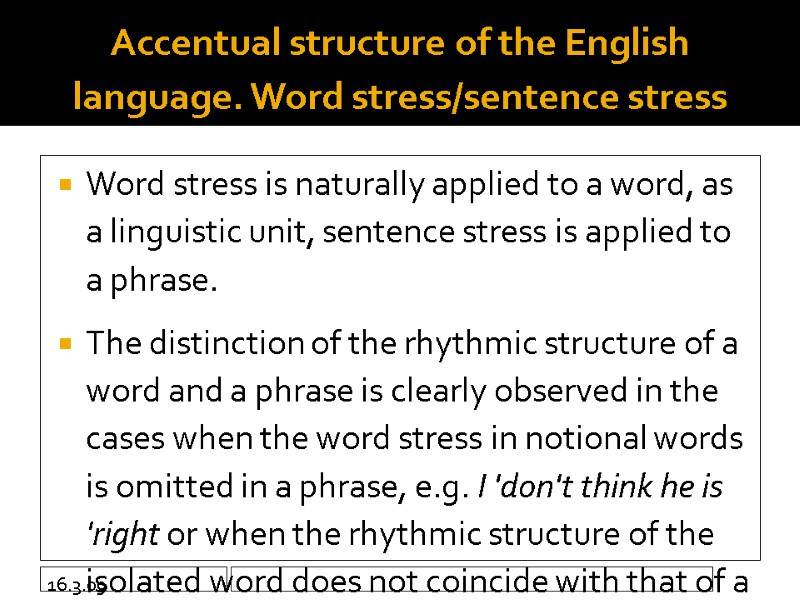
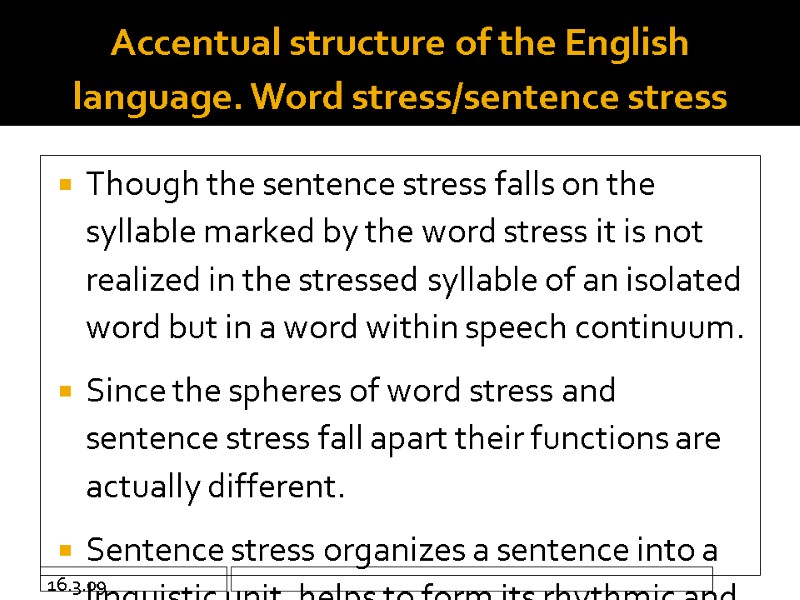
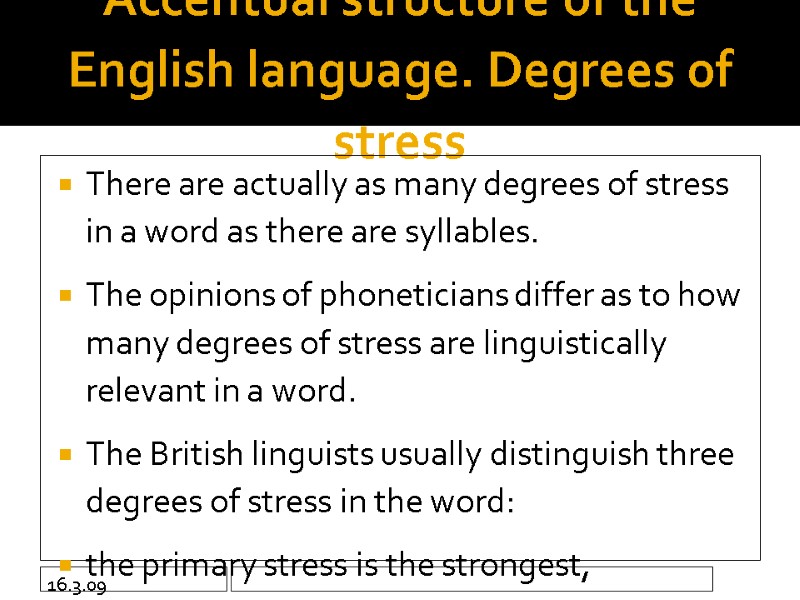
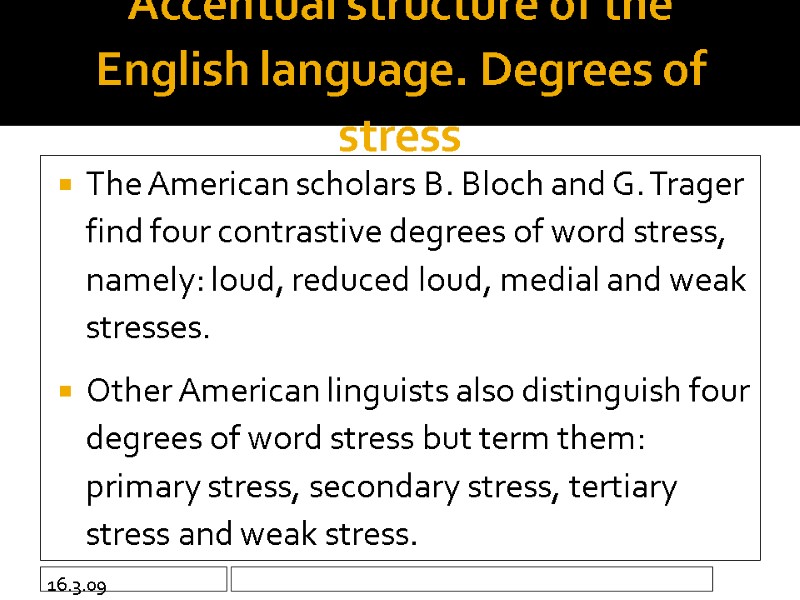
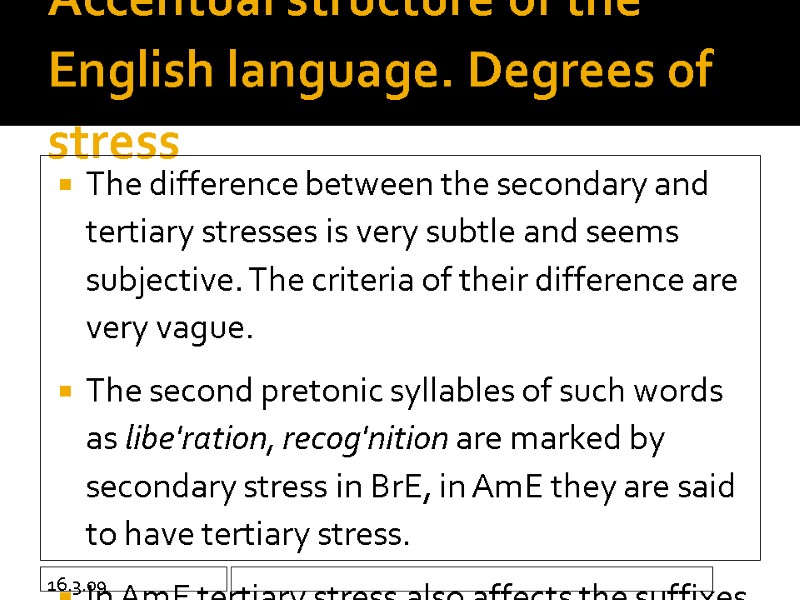
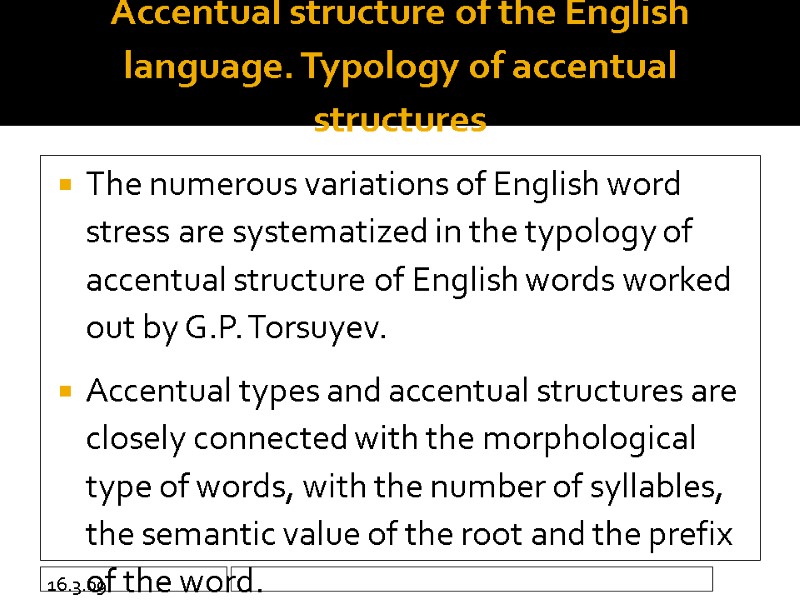
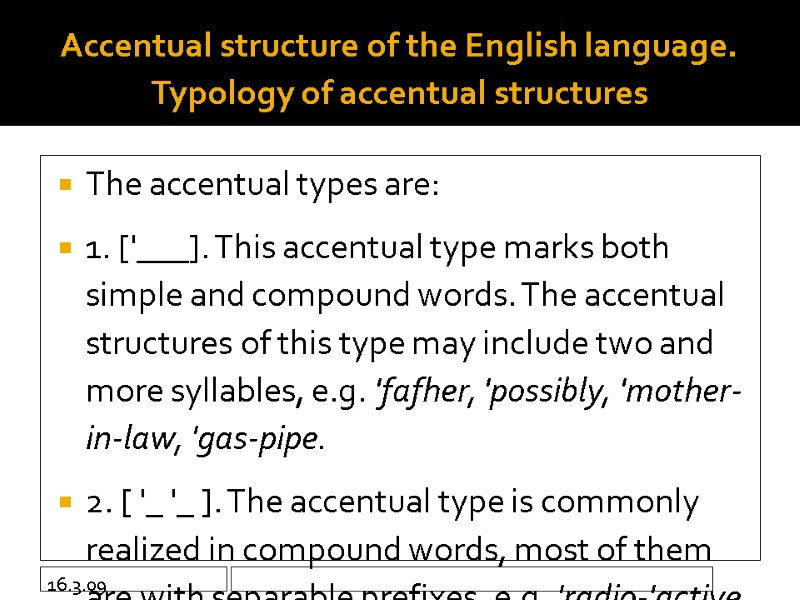
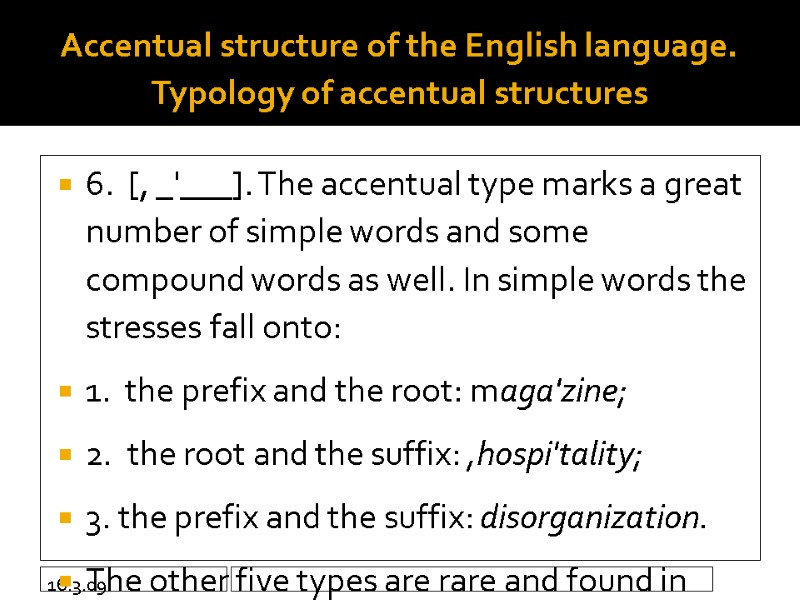
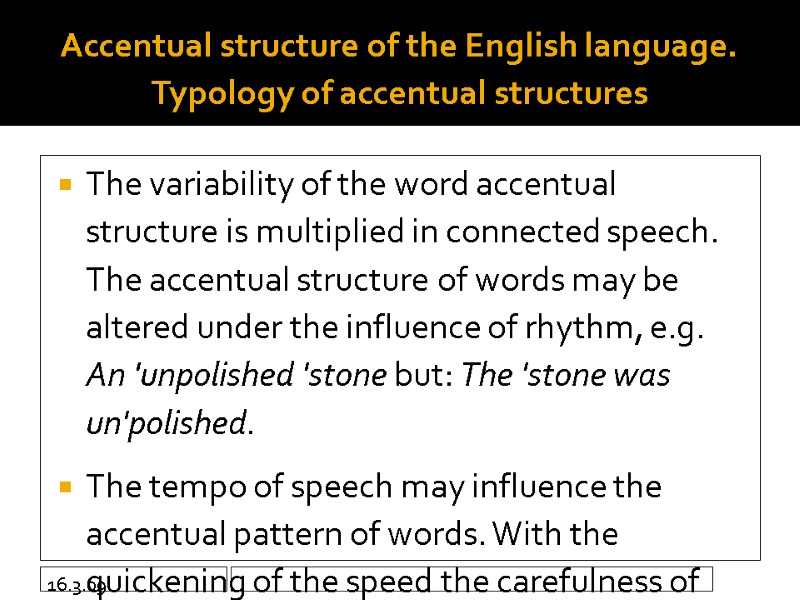
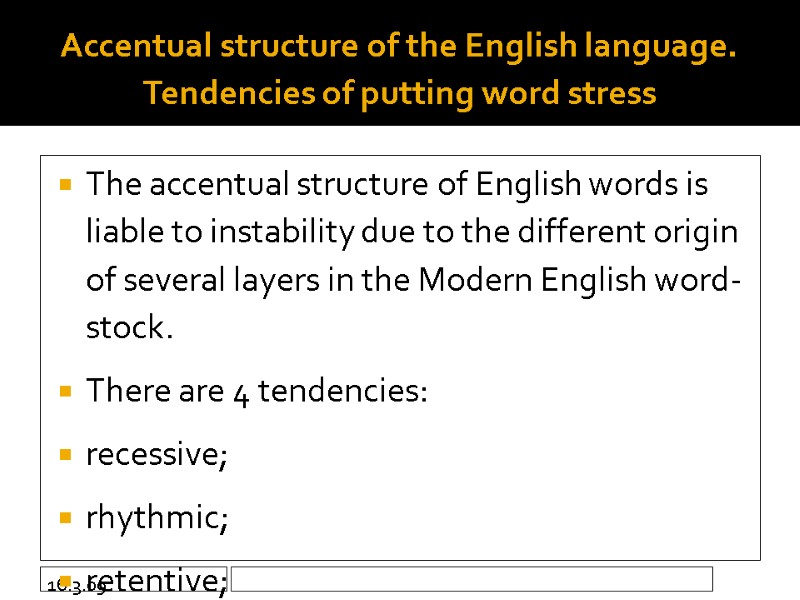
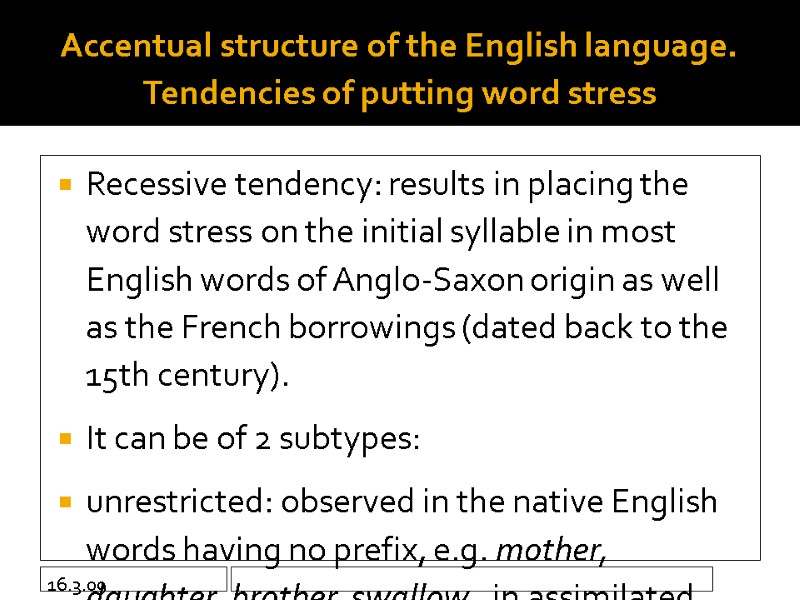
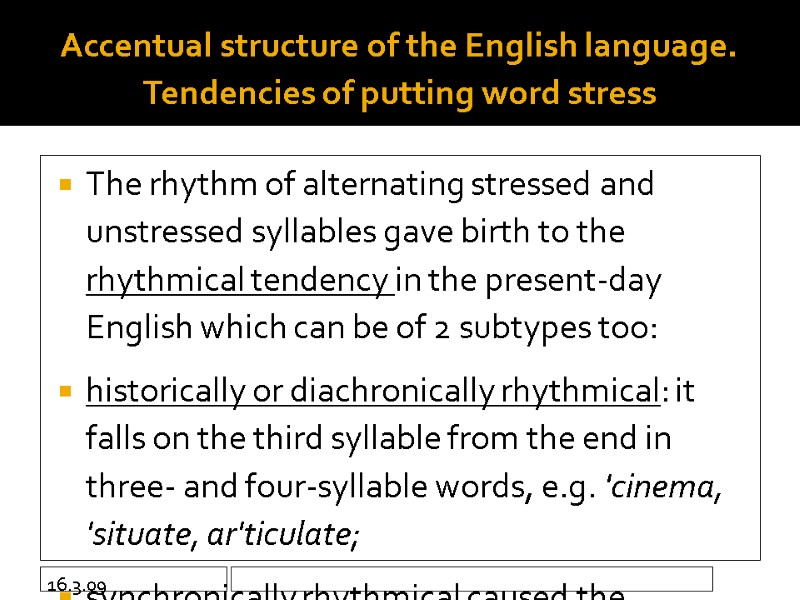
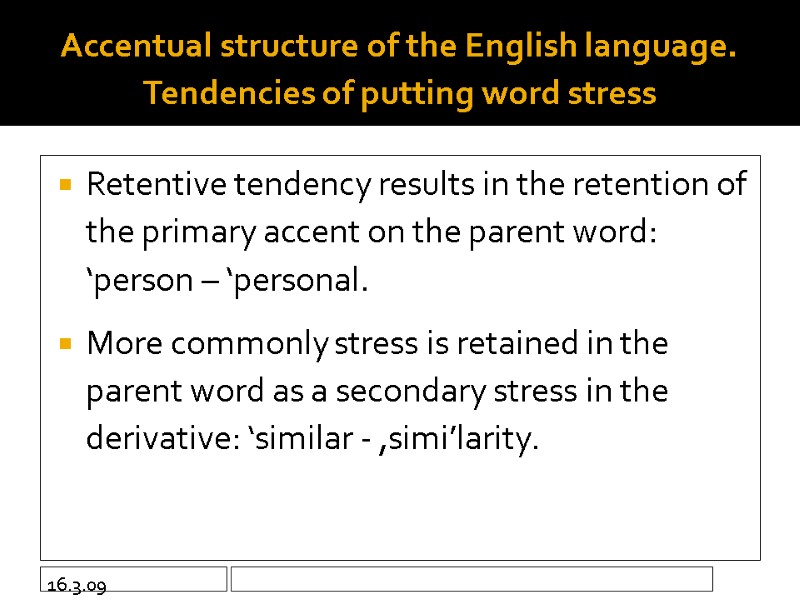
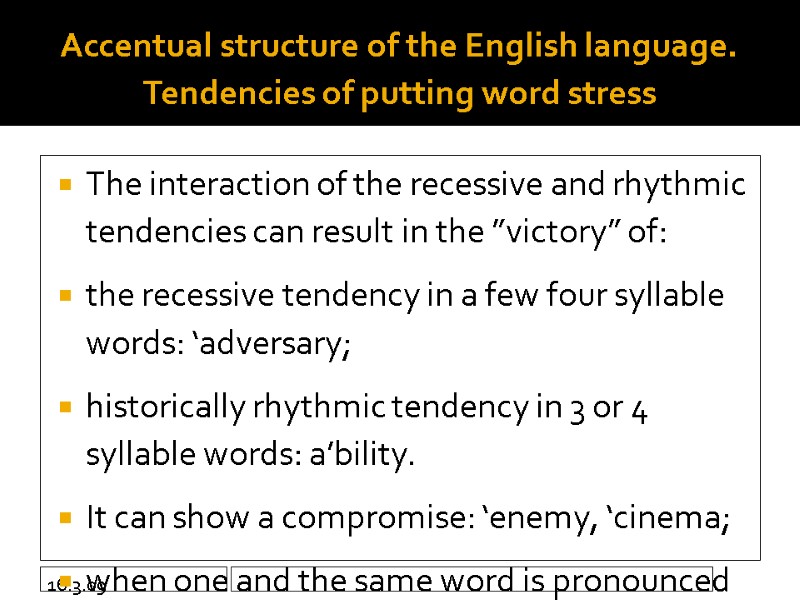
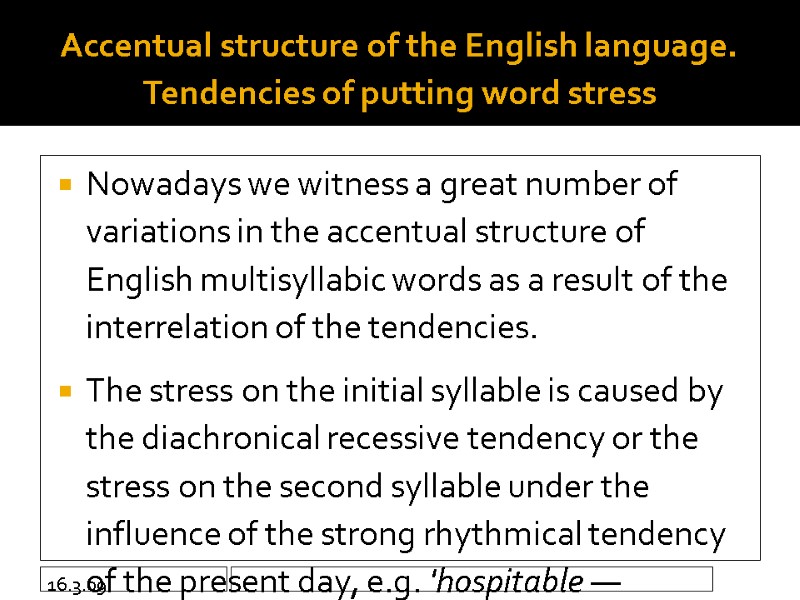
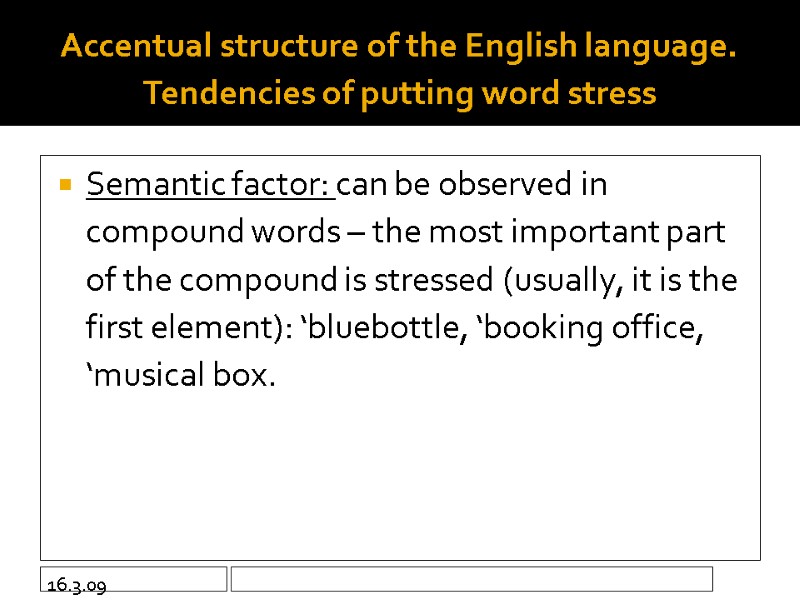
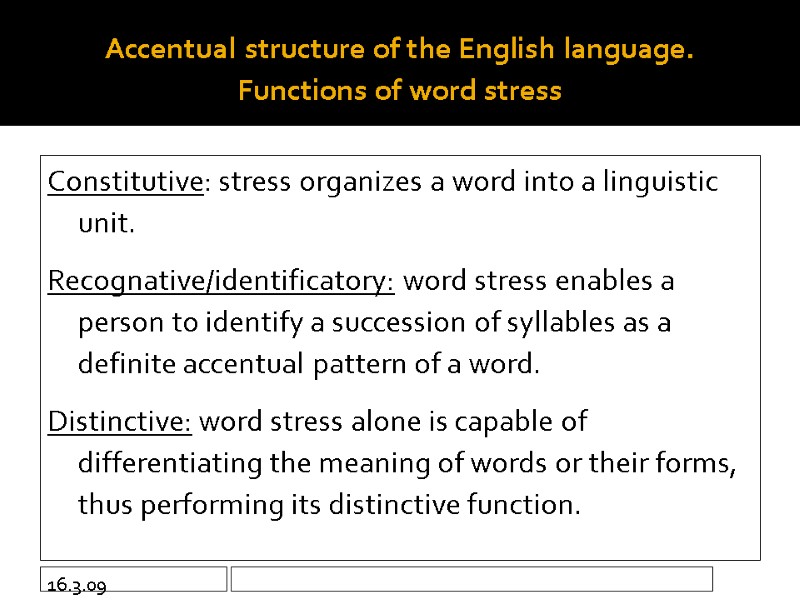
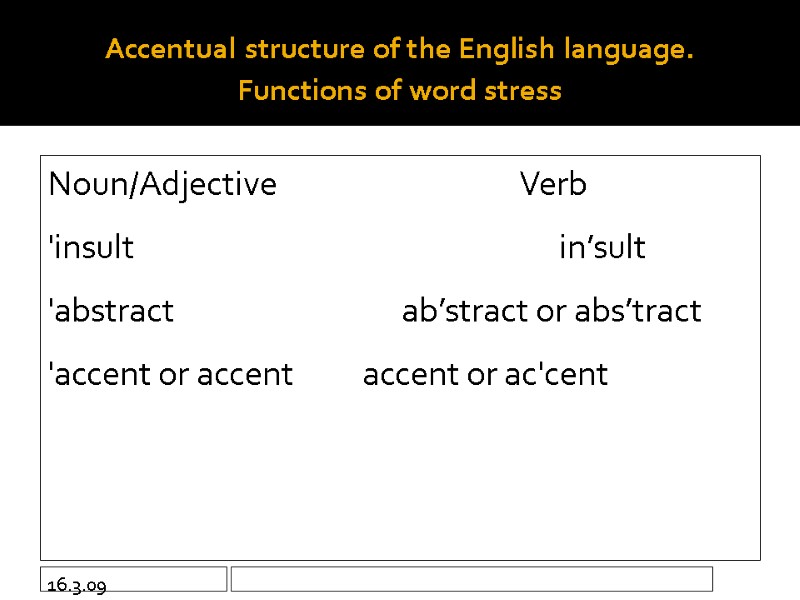
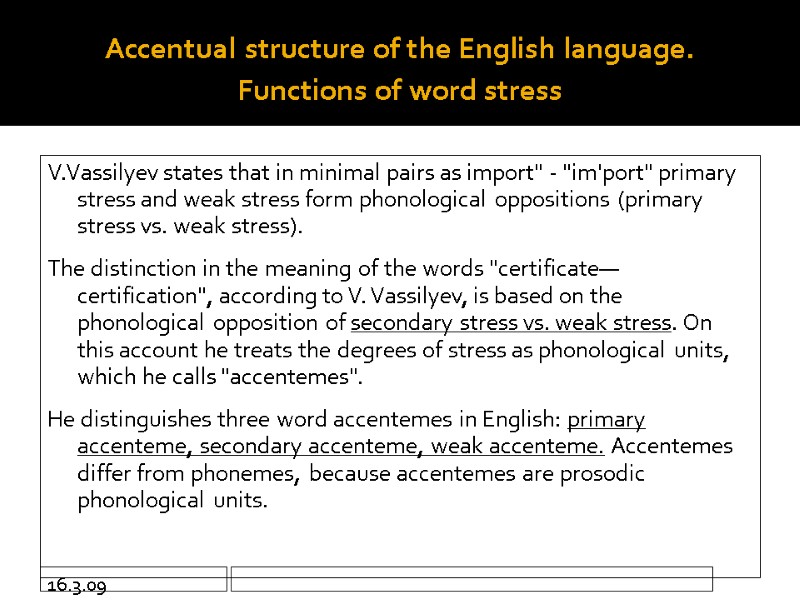
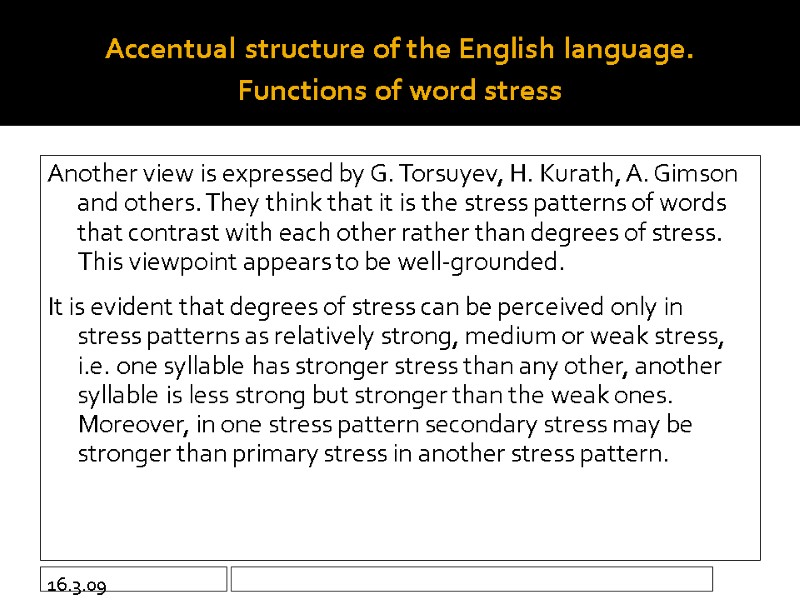
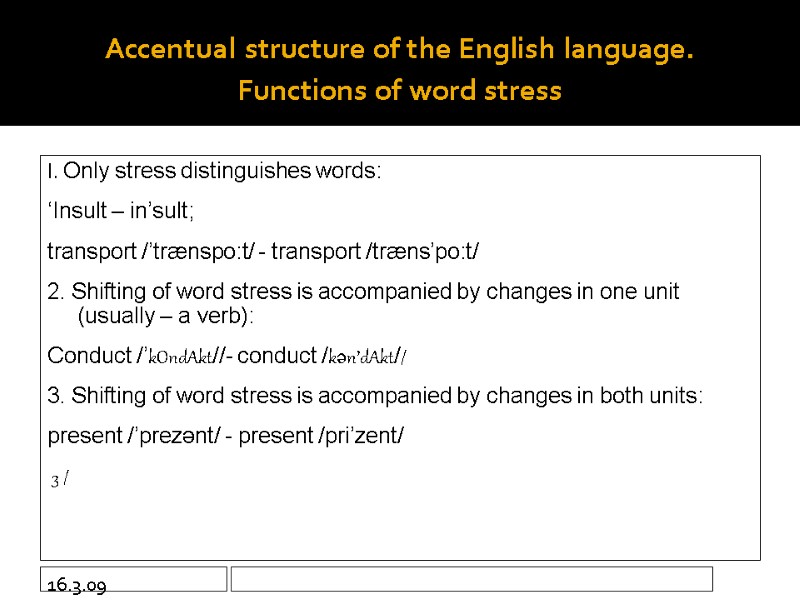
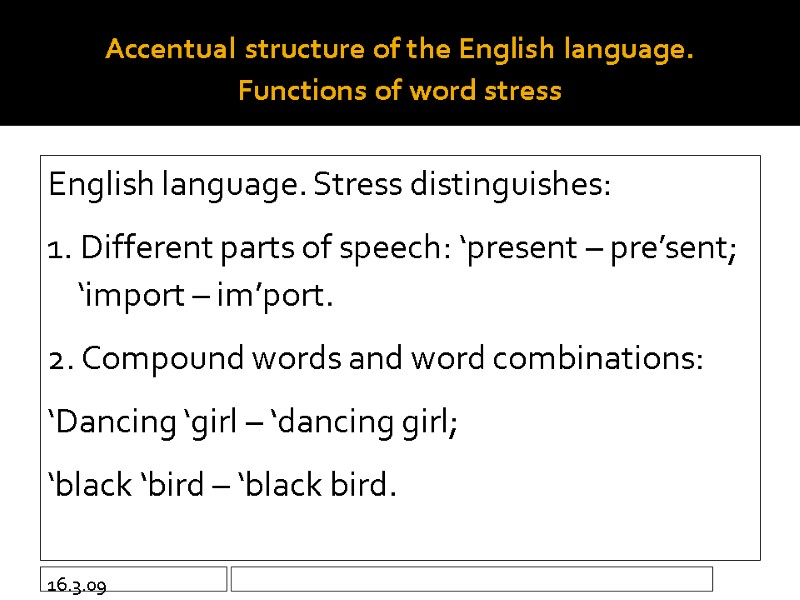
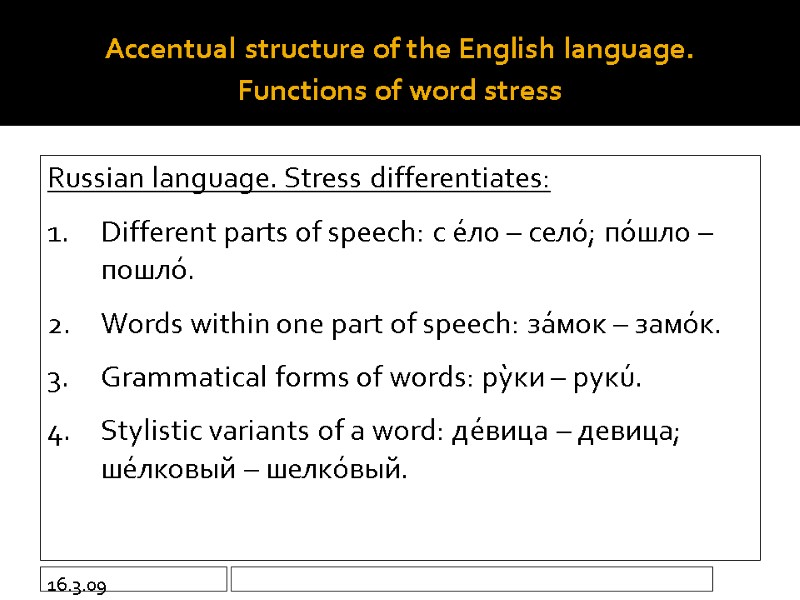
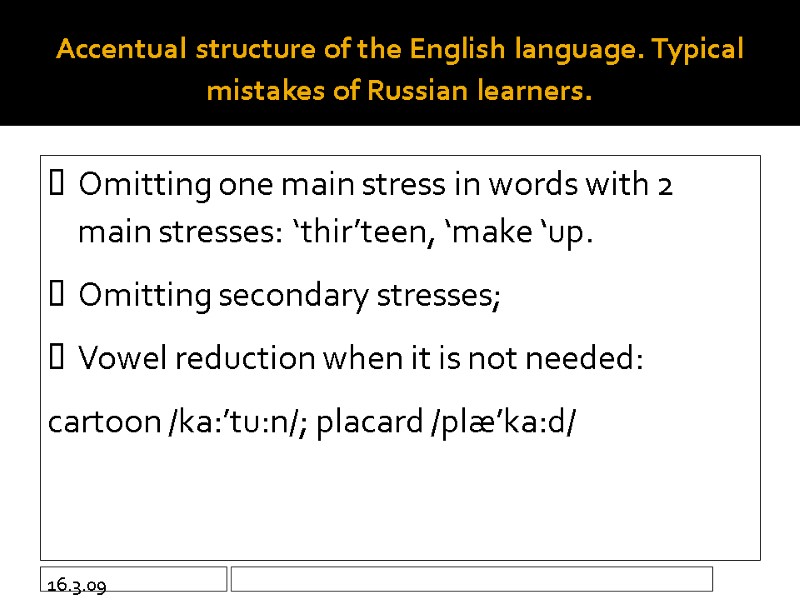
8144-accentual_structure.ppt
- Количество слайдов: 36
 16.3.09 Accentual structure of the English language The nature of word stress and its functions in language. Accent and prominence. Types of word stress. Degrees of word stress. The typology of accentual structure of English words. The peculiarities of the accentual structure of the English language.
16.3.09 Accentual structure of the English language The nature of word stress and its functions in language. Accent and prominence. Types of word stress. Degrees of word stress. The typology of accentual structure of English words. The peculiarities of the accentual structure of the English language.
 16.3.09 Accentual structure of the English language The sequence of syllables in the word is not pronounced identically. The syllable or syllables which are uttered with more prominence than the other syllables of the word are said to be stressed or accented. Stress in the isolated word is termed word stress; stress in connected speech is termed sentence stress.
16.3.09 Accentual structure of the English language The sequence of syllables in the word is not pronounced identically. The syllable or syllables which are uttered with more prominence than the other syllables of the word are said to be stressed or accented. Stress in the isolated word is termed word stress; stress in connected speech is termed sentence stress.
 16.3.09 Accentual structure of the English language Stress is defined differently by different authors. B.A. Bogoroditsky, for instance, defined stress as an increase of energy, accompanied by an increase of expiratory and articulatory activity. D. Jones defined stress as the degree of force, which is accompanied by a strong force of exhalation and gives an impression of loudness. H. Sweet also stated that stress, is connected with the force of breath. According to A.C. Gimson, the effect of prominence is achieved by any or all of four factors: force, tone, length and vowel colour.
16.3.09 Accentual structure of the English language Stress is defined differently by different authors. B.A. Bogoroditsky, for instance, defined stress as an increase of energy, accompanied by an increase of expiratory and articulatory activity. D. Jones defined stress as the degree of force, which is accompanied by a strong force of exhalation and gives an impression of loudness. H. Sweet also stated that stress, is connected with the force of breath. According to A.C. Gimson, the effect of prominence is achieved by any or all of four factors: force, tone, length and vowel colour.
 16.3.09 Accentual structure of the English language If we compare stressed and unstressed syllables in the words contract ['kσntrækt], to contract [kən'trækt], we may note that in the stressed syllable: (a) the force is greater, which is connected with more energetic articulation; (b) the pitch of voice is higher, which is connected with stronger tenseness of the vocal cords and the walls of the resonance chamber; (c) the quantity of the vowel [æ] in [kən'trækt] is greater, the vowel becomes longer; (d) the quality of the vowel [æ] in the stressed syllable is different from the quality of this vowel in the unstressed position, in which it is more narrow than ['æ].
16.3.09 Accentual structure of the English language If we compare stressed and unstressed syllables in the words contract ['kσntrækt], to contract [kən'trækt], we may note that in the stressed syllable: (a) the force is greater, which is connected with more energetic articulation; (b) the pitch of voice is higher, which is connected with stronger tenseness of the vocal cords and the walls of the resonance chamber; (c) the quantity of the vowel [æ] in [kən'trækt] is greater, the vowel becomes longer; (d) the quality of the vowel [æ] in the stressed syllable is different from the quality of this vowel in the unstressed position, in which it is more narrow than ['æ].
 16.3.09 Accentual structure of the English language Word stress can be defined as the singling out of one or more syllables in a word, which is accompanied by the change of the force of utterance, pitch of the voice, qualitative and quantitative characteristics of the sound, which is usually a vowel.
16.3.09 Accentual structure of the English language Word stress can be defined as the singling out of one or more syllables in a word, which is accompanied by the change of the force of utterance, pitch of the voice, qualitative and quantitative characteristics of the sound, which is usually a vowel.
 16.3.09 Accentual structure of the English language. Stress and prominence It is necessary to give some notes to the term “prominence”: as it is considered that stressed syllables are more prominent. But some phoneticians (G.P. Torsuev) are against using the notions “stressed” and “prominent” synonimically. The effect of prominence is created by phonetic features of sounds which have nothing in common with word or sentence stress.
16.3.09 Accentual structure of the English language. Stress and prominence It is necessary to give some notes to the term “prominence”: as it is considered that stressed syllables are more prominent. But some phoneticians (G.P. Torsuev) are against using the notions “stressed” and “prominent” synonimically. The effect of prominence is created by phonetic features of sounds which have nothing in common with word or sentence stress.
 16.3.09 Accentual structure of the English language. Stress and prominence All sounds of speech are characterized by different degrees of sonority. The most sonorous sounds are open vowels: /a:, α, o:, æ/. The least sonorous are voiceless plosives: /p, t, k/ . Sonority is the inner quality of vowels and it is not connected directly with the accentual structure of words. It is an additional component which influence the effect of prominence.
16.3.09 Accentual structure of the English language. Stress and prominence All sounds of speech are characterized by different degrees of sonority. The most sonorous sounds are open vowels: /a:, α, o:, æ/. The least sonorous are voiceless plosives: /p, t, k/ . Sonority is the inner quality of vowels and it is not connected directly with the accentual structure of words. It is an additional component which influence the effect of prominence.
 16.3.09 Accentual structure of the English language. Stress and prominence Another characteristic that adds to the effect of prominence but is not connected with word stress is the historical (traditional) vowel length. Traditionally, long sounds in stressed syllables are more prominent: /si:t – sit/. Prominence in speech is a broader term than stress: it’s a combination of loudness, length, quality of the vowel+the inherent sonority of the vowel and its historical length
16.3.09 Accentual structure of the English language. Stress and prominence Another characteristic that adds to the effect of prominence but is not connected with word stress is the historical (traditional) vowel length. Traditionally, long sounds in stressed syllables are more prominent: /si:t – sit/. Prominence in speech is a broader term than stress: it’s a combination of loudness, length, quality of the vowel+the inherent sonority of the vowel and its historical length
 16.3.09 Accentual structure of the English language. Types of word stress. In different languages one of the factors constituting word stress is usually more significant than the others. According to the most important feature different types, of word stress are distinguished in different languages. 1) If special prominence in a stressed syllable or syllables is achieved mainly through the intensity of articulation, such type of stress is called dynamic, or force stress. 2) If special prominence in a stressed syllable is achieved mainly through the change of pitch, or musical tone, such accent is called musical, or tonic. It is characteristic of the Japanese, Korean and other oriental languages.
16.3.09 Accentual structure of the English language. Types of word stress. In different languages one of the factors constituting word stress is usually more significant than the others. According to the most important feature different types, of word stress are distinguished in different languages. 1) If special prominence in a stressed syllable or syllables is achieved mainly through the intensity of articulation, such type of stress is called dynamic, or force stress. 2) If special prominence in a stressed syllable is achieved mainly through the change of pitch, or musical tone, such accent is called musical, or tonic. It is characteristic of the Japanese, Korean and other oriental languages.
 16.3.09 Accentual structure of the English language. Types of word stress. 3) If special prominence in a stressed syllable is achieved through the changes in the quantity of the vowels, which are longer in the stressed syllables than in the unstressed ones, such type of stress is called quantitative (New-Greek). 4) Qualitative type of stress is achieved through the changes in the quality of the vowel under stress.
16.3.09 Accentual structure of the English language. Types of word stress. 3) If special prominence in a stressed syllable is achieved through the changes in the quantity of the vowels, which are longer in the stressed syllables than in the unstressed ones, such type of stress is called quantitative (New-Greek). 4) Qualitative type of stress is achieved through the changes in the quality of the vowel under stress.
 16.3.09 Accentual structure of the English language. Types of word stress. English word stress is traditionally defined as dynamic, but in fact, the special prominence of the stressed syllables is manifested in the English language not only through the increase of intensity, but also through the changes in the vowel quantity, consonant and vowel quality and pitch of the voice. Russian word stress is not only dynamic but mostly quantitative and qualitative. The length of Russian vowels always depends on the position in a word.
16.3.09 Accentual structure of the English language. Types of word stress. English word stress is traditionally defined as dynamic, but in fact, the special prominence of the stressed syllables is manifested in the English language not only through the increase of intensity, but also through the changes in the vowel quantity, consonant and vowel quality and pitch of the voice. Russian word stress is not only dynamic but mostly quantitative and qualitative. The length of Russian vowels always depends on the position in a word.
 16.3.09 Accentual structure of the English language. Types of word stress. From the point of view of the position of stress in words and their grammatical forms accent can be accent can be characterized as free Fixed/ Languages with fixed stress: Latin, Polish, Lettish, French.
16.3.09 Accentual structure of the English language. Types of word stress. From the point of view of the position of stress in words and their grammatical forms accent can be accent can be characterized as free Fixed/ Languages with fixed stress: Latin, Polish, Lettish, French.
 16.3.09 Accentual structure of the English language. Word stress/sentence stress Word stress is naturally applied to a word, as a linguistic unit, sentence stress is applied to a phrase. The distinction of the rhythmic structure of a word and a phrase is clearly observed in the cases when the word stress in notional words is omitted in a phrase, e.g. I 'don't think he is 'right or when the rhythmic structure of the isolated word does not coincide with that of a phrase, e.g. 'Fifteen. 'Room Fifteen. 'Fifteen 'pages.
16.3.09 Accentual structure of the English language. Word stress/sentence stress Word stress is naturally applied to a word, as a linguistic unit, sentence stress is applied to a phrase. The distinction of the rhythmic structure of a word and a phrase is clearly observed in the cases when the word stress in notional words is omitted in a phrase, e.g. I 'don't think he is 'right or when the rhythmic structure of the isolated word does not coincide with that of a phrase, e.g. 'Fifteen. 'Room Fifteen. 'Fifteen 'pages.
 16.3.09 Accentual structure of the English language. Word stress/sentence stress Though the sentence stress falls on the syllable marked by the word stress it is not realized in the stressed syllable of an isolated word but in a word within speech continuum. Since the spheres of word stress and sentence stress fall apart their functions are actually different. Sentence stress organizes a sentence into a linguistic unit, helps to form its rhythmic and intonation pattern, and performs its distinctive function on the level of a phrase.
16.3.09 Accentual structure of the English language. Word stress/sentence stress Though the sentence stress falls on the syllable marked by the word stress it is not realized in the stressed syllable of an isolated word but in a word within speech continuum. Since the spheres of word stress and sentence stress fall apart their functions are actually different. Sentence stress organizes a sentence into a linguistic unit, helps to form its rhythmic and intonation pattern, and performs its distinctive function on the level of a phrase.
 16.3.09 Accentual structure of the English language. Degrees of stress There are actually as many degrees of stress in a word as there are syllables. The opinions of phoneticians differ as to how many degrees of stress are linguistically relevant in a word. The British linguists usually distinguish three degrees of stress in the word: the primary stress is the strongest, the secondary stress, all the other degrees are termed weak stress. Unstressed syllables are supposed to have weak stress
16.3.09 Accentual structure of the English language. Degrees of stress There are actually as many degrees of stress in a word as there are syllables. The opinions of phoneticians differ as to how many degrees of stress are linguistically relevant in a word. The British linguists usually distinguish three degrees of stress in the word: the primary stress is the strongest, the secondary stress, all the other degrees are termed weak stress. Unstressed syllables are supposed to have weak stress
 16.3.09 Accentual structure of the English language. Degrees of stress The American scholars B. Bloch and G. Trager find four contrastive degrees of word stress, namely: loud, reduced loud, medial and weak stresses. Other American linguists also distinguish four degrees of word stress but term them: primary stress, secondary stress, tertiary stress and weak stress.
16.3.09 Accentual structure of the English language. Degrees of stress The American scholars B. Bloch and G. Trager find four contrastive degrees of word stress, namely: loud, reduced loud, medial and weak stresses. Other American linguists also distinguish four degrees of word stress but term them: primary stress, secondary stress, tertiary stress and weak stress.
 16.3.09 Accentual structure of the English language. Degrees of stress The difference between the secondary and tertiary stresses is very subtle and seems subjective. The criteria of their difference are very vague. The second pretonic syllables of such words as libe'ration, recog'nition are marked by secondary stress in BrE, in AmE they are said to have tertiary stress. In AmE tertiary stress also affects the suffixes -ory, -ary, -ony of nouns and the suffixes –ate, -ize, -y of verbs, which are considered unstressed in BrE, e.g. 'territory, 'ceremony, 'dictionary; 'demonstrate, 'organize, 'simplify.
16.3.09 Accentual structure of the English language. Degrees of stress The difference between the secondary and tertiary stresses is very subtle and seems subjective. The criteria of their difference are very vague. The second pretonic syllables of such words as libe'ration, recog'nition are marked by secondary stress in BrE, in AmE they are said to have tertiary stress. In AmE tertiary stress also affects the suffixes -ory, -ary, -ony of nouns and the suffixes –ate, -ize, -y of verbs, which are considered unstressed in BrE, e.g. 'territory, 'ceremony, 'dictionary; 'demonstrate, 'organize, 'simplify.
 16.3.09 Accentual structure of the English language. Typology of accentual structures The numerous variations of English word stress are systematized in the typology of accentual structure of English words worked out by G.P. Torsuyev. Accentual types and accentual structures are closely connected with the morphological type of words, with the number of syllables, the semantic value of the root and the prefix of the word.
16.3.09 Accentual structure of the English language. Typology of accentual structures The numerous variations of English word stress are systematized in the typology of accentual structure of English words worked out by G.P. Torsuyev. Accentual types and accentual structures are closely connected with the morphological type of words, with the number of syllables, the semantic value of the root and the prefix of the word.
 16.3.09 Accentual structure of the English language. Typology of accentual structures The accentual types are: 1. ['___]. This accentual type marks both simple and compound words. The accentual structures of this type may include two and more syllables, e.g. 'fafher, 'possibly, 'mother-in-law, 'gas-pipe. 2. [ '_ '_ ]. The accentual type is commonly realized in compound words, most of them are with separable prefixes, e.g. 'radio-'active, 're'write, 'diso'bey. 3. [ '_' _ '_ ] and 4. ['_' _ '_ '_]. The accentual types are met in initial compound abbreviations like 'U'S'A, 'U'S'S'R. 5. ['_ ,___]. The type is realized both in simple and compound words, very common among compound words, e.g. 'hair-,dresser, 'substructure.
16.3.09 Accentual structure of the English language. Typology of accentual structures The accentual types are: 1. ['___]. This accentual type marks both simple and compound words. The accentual structures of this type may include two and more syllables, e.g. 'fafher, 'possibly, 'mother-in-law, 'gas-pipe. 2. [ '_ '_ ]. The accentual type is commonly realized in compound words, most of them are with separable prefixes, e.g. 'radio-'active, 're'write, 'diso'bey. 3. [ '_' _ '_ ] and 4. ['_' _ '_ '_]. The accentual types are met in initial compound abbreviations like 'U'S'A, 'U'S'S'R. 5. ['_ ,___]. The type is realized both in simple and compound words, very common among compound words, e.g. 'hair-,dresser, 'substructure.
 16.3.09 Accentual structure of the English language. Typology of accentual structures 6. [, _'___]. The accentual type marks a great number of simple words and some compound words as well. In simple words the stresses fall onto: 1. the prefix and the root: maga'zine; 2. the root and the suffix: ,hospi'tality; 3. the prefix and the suffix: disorganization. The other five types are rare and found in small number of words. The most widely spread among the enumerated accentual types are supposed to be Type 1, Type 2, Type 5 and Type 6.
16.3.09 Accentual structure of the English language. Typology of accentual structures 6. [, _'___]. The accentual type marks a great number of simple words and some compound words as well. In simple words the stresses fall onto: 1. the prefix and the root: maga'zine; 2. the root and the suffix: ,hospi'tality; 3. the prefix and the suffix: disorganization. The other five types are rare and found in small number of words. The most widely spread among the enumerated accentual types are supposed to be Type 1, Type 2, Type 5 and Type 6.
 16.3.09 Accentual structure of the English language. Typology of accentual structures The variability of the word accentual structure is multiplied in connected speech. The accentual structure of words may be altered under the influence of rhythm, e.g. An 'unpolished 'stone but: The 'stone was un'polished. The tempo of speech may influence the accentual pattern of words. With the quickening of the speed the carefulness of articulation is diminished, the vowels are reduced or elided, the secondary stress may be dropped, e.g. The 'whole organi'zation of the 'meeting was 'faulty.
16.3.09 Accentual structure of the English language. Typology of accentual structures The variability of the word accentual structure is multiplied in connected speech. The accentual structure of words may be altered under the influence of rhythm, e.g. An 'unpolished 'stone but: The 'stone was un'polished. The tempo of speech may influence the accentual pattern of words. With the quickening of the speed the carefulness of articulation is diminished, the vowels are reduced or elided, the secondary stress may be dropped, e.g. The 'whole organi'zation of the 'meeting was 'faulty.
 16.3.09 Accentual structure of the English language. Tendencies of putting word stress The accentual structure of English words is liable to instability due to the different origin of several layers in the Modern English word-stock. There are 4 tendencies: recessive; rhythmic; retentive; semantic
16.3.09 Accentual structure of the English language. Tendencies of putting word stress The accentual structure of English words is liable to instability due to the different origin of several layers in the Modern English word-stock. There are 4 tendencies: recessive; rhythmic; retentive; semantic
 16.3.09 Accentual structure of the English language. Tendencies of putting word stress Recessive tendency: results in placing the word stress on the initial syllable in most English words of Anglo-Saxon origin as well as the French borrowings (dated back to the 15th century). It can be of 2 subtypes: unrestricted: observed in the native English words having no prefix, e.g. mother, daughter, brother, swallow, ,in assimilated French borrowings, e.g. reason, colour, restaurant; restricted recessive tendency: it’s characterized by placing the word accent on the root of the word if this word has a prefix which has lost its meaning: e.g., foresee, begin, withdraw, apart.
16.3.09 Accentual structure of the English language. Tendencies of putting word stress Recessive tendency: results in placing the word stress on the initial syllable in most English words of Anglo-Saxon origin as well as the French borrowings (dated back to the 15th century). It can be of 2 subtypes: unrestricted: observed in the native English words having no prefix, e.g. mother, daughter, brother, swallow, ,in assimilated French borrowings, e.g. reason, colour, restaurant; restricted recessive tendency: it’s characterized by placing the word accent on the root of the word if this word has a prefix which has lost its meaning: e.g., foresee, begin, withdraw, apart.
 16.3.09 Accentual structure of the English language. Tendencies of putting word stress The rhythm of alternating stressed and unstressed syllables gave birth to the rhythmical tendency in the present-day English which can be of 2 subtypes too: historically or diachronically rhythmical: it falls on the third syllable from the end in three- and four-syllable words, e.g. 'cinema, 'situate, ar'ticulate; synchronically rhythmical caused the appearance of the secondary stress in the multisyllabic French borrowings, e.g. ,revo’lution, ,organi'sation, as,simi’lation.
16.3.09 Accentual structure of the English language. Tendencies of putting word stress The rhythm of alternating stressed and unstressed syllables gave birth to the rhythmical tendency in the present-day English which can be of 2 subtypes too: historically or diachronically rhythmical: it falls on the third syllable from the end in three- and four-syllable words, e.g. 'cinema, 'situate, ar'ticulate; synchronically rhythmical caused the appearance of the secondary stress in the multisyllabic French borrowings, e.g. ,revo’lution, ,organi'sation, as,simi’lation.
 16.3.09 Accentual structure of the English language. Tendencies of putting word stress Retentive tendency results in the retention of the primary accent on the parent word: ‘person – ‘personal. More commonly stress is retained in the parent word as a secondary stress in the derivative: ‘similar - ,simi’larity.
16.3.09 Accentual structure of the English language. Tendencies of putting word stress Retentive tendency results in the retention of the primary accent on the parent word: ‘person – ‘personal. More commonly stress is retained in the parent word as a secondary stress in the derivative: ‘similar - ,simi’larity.
 16.3.09 Accentual structure of the English language. Tendencies of putting word stress The interaction of the recessive and rhythmic tendencies can result in the ”victory” of: the recessive tendency in a few four syllable words: ‘adversary; historically rhythmic tendency in 3 or 4 syllable words: a’bility. It can show a compromise: ‘enemy, ‘cinema; when one and the same word is pronounced according to both tendencies: territory - /’teritəri/ - /’teritri/
16.3.09 Accentual structure of the English language. Tendencies of putting word stress The interaction of the recessive and rhythmic tendencies can result in the ”victory” of: the recessive tendency in a few four syllable words: ‘adversary; historically rhythmic tendency in 3 or 4 syllable words: a’bility. It can show a compromise: ‘enemy, ‘cinema; when one and the same word is pronounced according to both tendencies: territory - /’teritəri/ - /’teritri/
 16.3.09 Accentual structure of the English language. Tendencies of putting word stress Nowadays we witness a great number of variations in the accentual structure of English multisyllabic words as a result of the interrelation of the tendencies. The stress on the initial syllable is caused by the diachronical recessive tendency or the stress on the second syllable under the influence of the strong rhythmical tendency of the present day, e.g. 'hospitable — ho'spitable, 'distribute — dis'tribute, 'aristocrat — a'ristocrat, 'laryngoscope — la'ryngoscope.
16.3.09 Accentual structure of the English language. Tendencies of putting word stress Nowadays we witness a great number of variations in the accentual structure of English multisyllabic words as a result of the interrelation of the tendencies. The stress on the initial syllable is caused by the diachronical recessive tendency or the stress on the second syllable under the influence of the strong rhythmical tendency of the present day, e.g. 'hospitable — ho'spitable, 'distribute — dis'tribute, 'aristocrat — a'ristocrat, 'laryngoscope — la'ryngoscope.
 16.3.09 Accentual structure of the English language. Tendencies of putting word stress Semantic factor: can be observed in compound words – the most important part of the compound is stressed (usually, it is the first element): ‘bluebottle, ‘booking office, ‘musical box.
16.3.09 Accentual structure of the English language. Tendencies of putting word stress Semantic factor: can be observed in compound words – the most important part of the compound is stressed (usually, it is the first element): ‘bluebottle, ‘booking office, ‘musical box.
 16.3.09 Accentual structure of the English language. Functions of word stress Constitutive: stress organizes a word into a linguistic unit. Recognative/identificatory: word stress enables a person to identify a succession of syllables as a definite accentual pattern of a word. Distinctive: word stress alone is capable of differentiating the meaning of words or their forms, thus performing its distinctive function.
16.3.09 Accentual structure of the English language. Functions of word stress Constitutive: stress organizes a word into a linguistic unit. Recognative/identificatory: word stress enables a person to identify a succession of syllables as a definite accentual pattern of a word. Distinctive: word stress alone is capable of differentiating the meaning of words or their forms, thus performing its distinctive function.
 16.3.09 Accentual structure of the English language. Functions of word stress Noun/Adjective Verb 'insult in’sult 'abstract ab’stract or abs’tract 'accent or accent accent or ac'cent
16.3.09 Accentual structure of the English language. Functions of word stress Noun/Adjective Verb 'insult in’sult 'abstract ab’stract or abs’tract 'accent or accent accent or ac'cent
 16.3.09 Accentual structure of the English language. Functions of word stress V.Vassilyev states that in minimal pairs as import" - "im'port" primary stress and weak stress form phonological oppositions (primary stress vs. weak stress). The distinction in the meaning of the words "certificate— certification", according to V. Vassilyev, is based on the phonological opposition of secondary stress vs. weak stress. On this account he treats the degrees of stress as phonological units, which he calls "accentemes". He distinguishes three word accentemes in English: primary accenteme, secondary accenteme, weak accenteme. Accentemes differ from phonemes, because accentemes are prosodic phonological units.
16.3.09 Accentual structure of the English language. Functions of word stress V.Vassilyev states that in minimal pairs as import" - "im'port" primary stress and weak stress form phonological oppositions (primary stress vs. weak stress). The distinction in the meaning of the words "certificate— certification", according to V. Vassilyev, is based on the phonological opposition of secondary stress vs. weak stress. On this account he treats the degrees of stress as phonological units, which he calls "accentemes". He distinguishes three word accentemes in English: primary accenteme, secondary accenteme, weak accenteme. Accentemes differ from phonemes, because accentemes are prosodic phonological units.
 16.3.09 Accentual structure of the English language. Functions of word stress Another view is expressed by G. Torsuyev, H. Kurath, A. Gimson and others. They think that it is the stress patterns of words that contrast with each other rather than degrees of stress. This viewpoint appears to be well-grounded. It is evident that degrees of stress can be perceived only in stress patterns as relatively strong, medium or weak stress, i.e. one syllable has stronger stress than any other, another syllable is less strong but stronger than the weak ones. Moreover, in one stress pattern secondary stress may be stronger than primary stress in another stress pattern.
16.3.09 Accentual structure of the English language. Functions of word stress Another view is expressed by G. Torsuyev, H. Kurath, A. Gimson and others. They think that it is the stress patterns of words that contrast with each other rather than degrees of stress. This viewpoint appears to be well-grounded. It is evident that degrees of stress can be perceived only in stress patterns as relatively strong, medium or weak stress, i.e. one syllable has stronger stress than any other, another syllable is less strong but stronger than the weak ones. Moreover, in one stress pattern secondary stress may be stronger than primary stress in another stress pattern.
 16.3.09 Accentual structure of the English language. Functions of word stress I. Only stress distinguishes words: ‘Insult – in’sult; transport /’trænspo:t/ - transport /træns’po:t/ 2. Shifting of word stress is accompanied by changes in one unit (usually – a verb): Conduct /’kOndAkt//- conduct /kən’dAkt// 3. Shifting of word stress is accompanied by changes in both units: present /’prezənt/ - present /pri’zent/ 3 /
16.3.09 Accentual structure of the English language. Functions of word stress I. Only stress distinguishes words: ‘Insult – in’sult; transport /’trænspo:t/ - transport /træns’po:t/ 2. Shifting of word stress is accompanied by changes in one unit (usually – a verb): Conduct /’kOndAkt//- conduct /kən’dAkt// 3. Shifting of word stress is accompanied by changes in both units: present /’prezənt/ - present /pri’zent/ 3 /
 16.3.09 Accentual structure of the English language. Functions of word stress English language. Stress distinguishes: 1. Different parts of speech: ‘present – pre’sent; ‘import – im’port. 2. Compound words and word combinations: ‘Dancing ‘girl – ‘dancing girl; ‘black ‘bird – ‘black bird.
16.3.09 Accentual structure of the English language. Functions of word stress English language. Stress distinguishes: 1. Different parts of speech: ‘present – pre’sent; ‘import – im’port. 2. Compound words and word combinations: ‘Dancing ‘girl – ‘dancing girl; ‘black ‘bird – ‘black bird.
 16.3.09 Accentual structure of the English language. Functions of word stress Russian language. Stress differentiates: Different parts of speech: с éло – селó; пóшло – пошлó. Words within one part of speech: зáмок – замóк. Grammatical forms of words: рỳки – рукú. Stylistic variants of a word: дéвица – девица; шéлковый – шелкóвый.
16.3.09 Accentual structure of the English language. Functions of word stress Russian language. Stress differentiates: Different parts of speech: с éло – селó; пóшло – пошлó. Words within one part of speech: зáмок – замóк. Grammatical forms of words: рỳки – рукú. Stylistic variants of a word: дéвица – девица; шéлковый – шелкóвый.
 16.3.09 Accentual structure of the English language. Typical mistakes of Russian learners. Omitting one main stress in words with 2 main stresses: ‘thir’teen, ‘make ‘up. Omitting secondary stresses; Vowel reduction when it is not needed: cartoon /ka:’tu:n/; placard /plæ’ka:d/
16.3.09 Accentual structure of the English language. Typical mistakes of Russian learners. Omitting one main stress in words with 2 main stresses: ‘thir’teen, ‘make ‘up. Omitting secondary stresses; Vowel reduction when it is not needed: cartoon /ka:’tu:n/; placard /plæ’ka:d/

